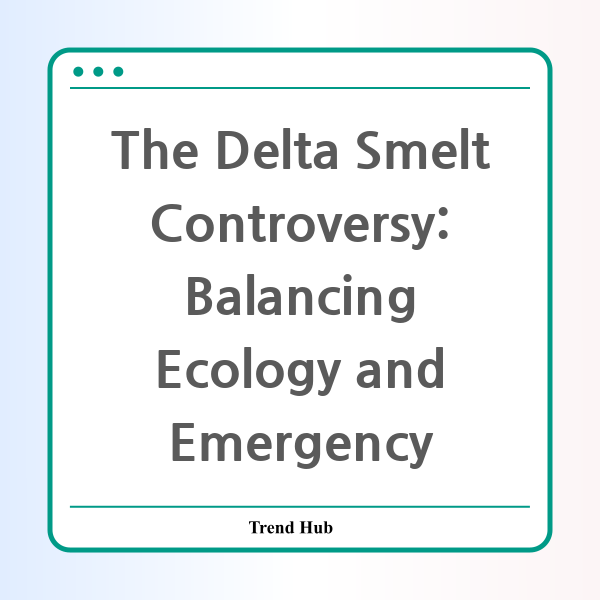* This website participates in the Amazon Affiliate Program and earns from qualifying purchases.

When a three-inch fish becomes a political football, you know the stakes in the California water crisis have reached new heights. The delta smelt, an endangered fish endemic to the Sacramento-San Joaquin Delta, has found itself at the center of a heated debate, particularly with recent remarks by political figures regarding its impact on water supply in California. This situation raises an important question: how do we balance ecological preservation with the urgent needs of human populations during environmental emergencies?
The delta smelt is more than just a tiny fish; it's a symbol of the complex relationship between environmental regulation and water management in one of the most populous states in the U.S. The ongoing drought conditions and devastating wildfires in California have made water scarcity a pressing issue, and the decisions surrounding its distribution have become a contentious topic. The debate has intensified as key figures, including the former President, have expressed frustration over the perceived impact of environmental regulations aimed at protecting species like the delta smelt.
Critics argue that regulations designed to protect the delta smelt inhibit the ability of state officials to access vital water resources needed to combat wildfires and support agricultural needs. They claim that the management of California’s water resources has been compromised to the detriment of communities facing crises. But what is the root of this controversy, and how does it affect the broader ecological landscape?
To better understand this issue, it is crucial to examine the significance of the delta smelt within its ecosystem. The delta smelt has become an indicator species, meaning its health reflects the overall condition of the ecosystem it inhabits. It plays a critical role in the food web, and its declining numbers are a warning sign about the health of California's water systems. Protecting this species is not just about saving one fish; it's about ensuring a sustainable future for California's aquatic ecosystems.
However, as conditions worsen in Southern California, the frustration over water allowances grows. Many argue that the existing rules do not adequately account for emergency situations such as wildfires, where immediate access to water can save lives and property. The contention arises when individuals suggest that protecting the delta smelt has led to choices that endanger larger populations.
In recent discussions, those defending the environmental restrictions have proposed that California's water infrastructure requires modernization and improvements, rather than simply allocating more water. Experts have highlighted that the real issue in fighting fires is not merely a lack of water but rather challenges in the water delivery infrastructure that fail to maintain necessary pressure and flow.
This marks a pivotal moment in California’s history where water management policies need revisiting. The traditional approach of prioritizing ecological protections, particularly for endangered species, must evolve to incorporate flexibility for emergency responses. Solutions must involve a call for collaboration among stakeholders, including environmentalists, government officials, agricultural representatives, and emergency management personnel, to find a balanced approach.
As we continue to navigate issues related to climate change, droughts, and wildfires, the case of the delta smelt serves as a reminder of the need to balance human needs with ecological preservation. Moving forward, it is crucial to have nuanced conversations that respect both the science behind ecological protections and the realities faced by communities during environmental emergencies.
Ultimately, California's water crisis and the role of the delta smelt provide a lens through which we can examine broader themes in environmental policy, climate adaptation, and public discourse on resource management. While it may seem trivial to focus on a small fish amidst widespread disaster, it underscores an essential truth: the health of our ecosystems is intrinsically linked to the wellbeing of our communities. Finding sustainable solutions requires a holistic understanding of both human and environmental needs.
* This website participates in the Amazon Affiliate Program and earns from qualifying purchases.